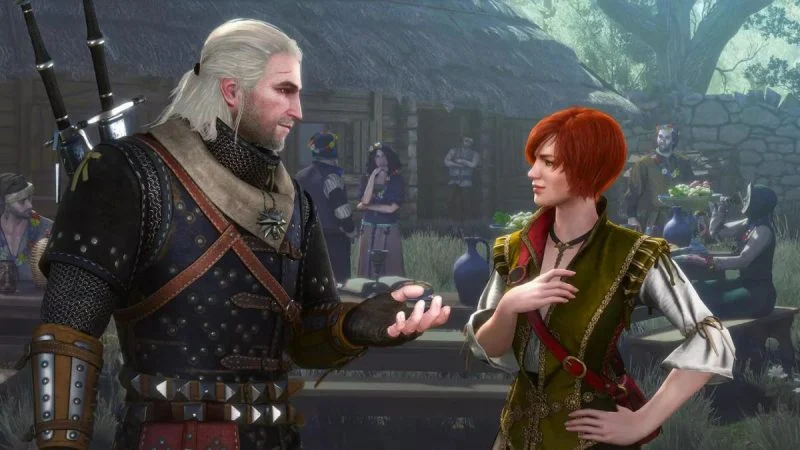Introduction to The Witcher 3: A Timeless RPG
The Witcher 3: Wild Hunt, released in May 2015, quickly positioned itself as a landmark title in the role-playing game (RPG) genre, earning widespread acclaim from both critics and players alike. Developed by CD Projekt Red, this game stands out for its rich narrative and immersive world-building, qualities that have contributed to its enduring popularity. Set in a beautifully crafted open world, players assume the role of Geralt of Rivia, a monster hunter navigated through a tapestry of intricate quests, political intrigue, and deep moral decisions.
The game’s critical success is primarily attributed to its ability to engage players emotionally through expertly developed characters and story arcs. With a plethora of choices affecting the game’s outcome, The Witcher 3 offers a unique experience for each player, creating a strong connection with its audience. It has garnered numerous awards, including Game of the Year accolades from various gaming publications, establishing itself as a cult favorite that continues to captivate new generations of gamers.
As we explore the ongoing updates and their effects on this classic RPG, it is essential to recognize how The Witcher 3’s legacy continues to thrive. It serves as a testament to the potential longevity of video games when they are crafted with care and passion, reminding us of the incredible narratives and worlds that define the gaming experience today.
Key Updates and Expansions Since 2020
Since its initial release, The Witcher 3: Wild Hunt has undergone a myriad of significant updates and expansions, particularly from 2020 to 2025. CD Projekt Red has been diligent in enhancing the gaming experience, ensuring both new and returning players find value in the game. One major enhancement was the introduction of the “Next-Gen Update” in December 2022, which provided improved graphics and performance across all platforms. This update included ray tracing features, delivering a more immersive visual experience and optimizing the game for modern hardware. The enhanced graphics breathe new life into the game’s stunning landscapes and atmosphere, making it more appealing to new players while giving veterans a reason to revisit their favorite locations.
In addition to graphical improvements, several new quests and storylines have been introduced through expansions and DLCs, enriching the lore and providing players with fresh narratives. The content expansions, including “Blood and Wine” and “Hearts of Stone,” have been particularly well-received, with robust storylines and new characters that engage players and deepen their connection to Geralt’s world. The continual refinement of gameplay mechanics has also played a critical role in keeping the experience engaging. Mechanics such as improved combat systems and more intuitive inventory management help streamline gameplay, enhancing user experience without compromising the game’s complexity.
The modding community has also significantly impacted The Witcher 3 landscape. CD Projekt Red’s support for modders has encouraged a plethora of fan-created content, from new quests to enhanced gameplay features, which often reflect community feedback. This active collaboration has transformed the player experience, ensuring that the game evolves beyond its original framework. The commitment to addressing player feedback and integrating community-driven improvements highlights CD Projekt Red’s engagement with its audience. These updates have notably revitalized interest in The Witcher 3, positioning it as a timeless RPG, revered by both newcomers and long-time fans alike.
The Current Gaming Landscape and The Witcher 3’s Place in It
In 2025, the gaming industry is marked by rapid advancements in technology and evolving player expectations. Virtual reality (VR), augmented reality (AR), and artificial intelligence (AI) have transformed the way games are developed and experienced. Many RPGs released in recent years have embraced these technologies, creating immersive worlds that captivate players. Nevertheless, The Witcher 3 continues to carve out a significant space in this competitive environment, thanks to its rich storytelling and expansive open world.
The integration of AI in gaming has brought forth dynamic narratives and responsive environments, yet The Witcher 3 maintains a unique appeal with its meticulously crafted quests and character interactions. The game’s decision-making mechanics resonate with players, encouraging them to engage deeply with its narrative threads. As newer RPGs emerge, often utilizing advanced technology to enhance player experiences, The Witcher 3 holds its ground by offering a well-rounded experience that balances traditional RPG elements with innovative gameplay.
Furthermore, community sentiment plays a pivotal role in shaping the game’s enduring legacy. Many players continue to express their appreciation for The Witcher 3 on various platforms, bolstered by constant updates and mods that have revitalized the game. The community’s engagement fosters ongoing discussions about strategies and lore, which keeps the game relevant amidst a sea of new titles. Even with the influx of advanced gaming experiences in 2025, the loyal player base of The Witcher 3 remains strong, demonstrating its status as a cult classic.
As the landscape of gaming evolves, The Witcher 3 showcases how a well-developed narrative and strong community can sustain a game’s relevance. In a world where RPGs are increasingly defined by technological advancements, it is the blend of storytelling and player agency that continues to draw interest in The Witcher 3, solidifying its place in contemporary gaming culture.
Looking Ahead: Future Prospects for The Witcher Franchise
The Witcher franchise has firmly established itself as a cornerstone of modern gaming, and as we look beyond 2025, the potential for new developments remains promising. The enduring popularity of The Witcher 3, particularly following its regular updates and expansions, indicates a strong foundation for further projects. CD Projekt Red, the studio behind the franchise, has garnered a dedicated fanbase that continues to engage with the narrative and world, creating an environment ripe for exploration of new content.
One of the most anticipated aspects of the franchise’s future is the possibility of new games. Whether this means a direct sequel to The Witcher 3 or an entirely new adventure set in the same universe, fans are eager to see where the story may lead next. Given the success of spin-off titles and adaptations—such as the Netflix series—CD Projekt Red might consider various avenues for storytelling, including mobile games or expanded universe narratives. Emerging technology may also pave the way for virtual reality experiences that transport players deeper into the richly woven lore of The Witcher.
Continued updates for The Witcher 3 are likely to align with trends in gaming, emphasizing ongoing support for existing titles as seen with other successful franchises. Regular patches, new downloadable content (DLC), or even collaborations with other popular series could breathe new life into the game, keeping the community engaged and energized. Fans have voiced hopes for additional narrative arcs or character explorations, signifying a desire for more depth within the already expansive narrative.
As community engagement remains a bedrock of its success, CD Projekt Red can nurture its loyal base through interactive experiences, such as community-driven storytelling or forums for fan theories. The evolution of The Witcher franchise will depend on how well it responds to the needs and desires of its audience while embracing innovation and fresh storytelling methods.


No responses yet